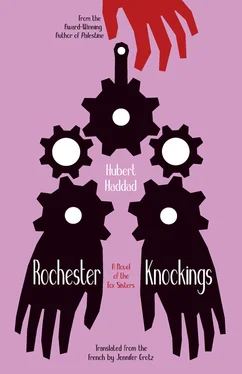It was to the Fox sisters, however, ever since that famous night in Corinthian Hall, that he unequivocally attributed his brand new vocation. For the last several months, he’d been able to improve his concepts as a tutor of Chinese wisdom or of the hierarchy of angels among the Catholics and Muslims. Easily convinced of the Great Spirit’s love, the values of progress and the telegraphic function of the pineal gland (that antenna to the cosmos), it remained only for him to deck himself out in mourning clothes like any respectable commissioner of the beyond. Something achieved not without elegance, he amassed for himself a complete set of conjuring equipment thanks to his poker winnings: smoke bombs, a pulley system, cardboard heads, bulb syringes, magnetite rollers, fake hands made of resin, silk scarves, trick shoes, a couple of small tables covered in papier-mâché, some miniature shelves on wheels for automatic writing, screens, and a supply of candles acquired honestly in a Catholic church.
His very first demonstration took place in the private room of a brothel in Rochester before an audience consisting mostly of girls from the establishment and married men of good society. Madame Tripistine, the manager of Cevennes origin who had received him in her room and appreciated his urbanity as well as his way of opening bottles with his teeth, hired him for awhile as a bouncer, then remained friends with him after having made it understood that he was too bellicose for employment. It was she who had offered to let him make his debut at the brothel. “My girls will adore spirits,” Madame Tripistine had assured him, “because of all the sorrows they lug around.” Thus they lined up over thirty chairs in five or six rows, for the pimps and big shots of the area who wanted to be there, alongside the regular clientele slumming it. The stage set up between two screens was hardly bigger than a Guignol puppet theatre, but the apprentice medium found himself at ease and, showing a rare ability to make tables talk, provoked happy swoons among the ladies. Finding the use of mechanical transcriptions rather tedious, Pill even improvised by letting the spirit speak through his voice. A lout with a battered nose and ears shouted out to him at the same moment a cleverly placed fan blew forth a ghost made of silicate powder:
“And what does your spirit think of what I’m carrying under my jacket?”
William Pill, who remembered from his time as a security guard throwing this individual, then dead drunk, out one night after the precautionary confiscation of his weapon, had not forgotten what the collector’s object was.
“A Colt 1851 Navy revolver, serial number 27139. . Is that right?”
“That’s the truth! But as for the number. . let’s see now,” said the man, taking out his weapon in front of everyone.
When he had called out the numbers in the right order, the audience clapped and whistled in amazement. But it wasn’t until after having put Madame Tripistine in communication with her dead father — a disturbed and rigid man who, between his daughter’s twelfth and eighteenth birthdays, on certain Sundays, had the crazed idea of whipping her half-naked while her arms were tied around a freshly-killed pig whose blood she had to drink to heal her lungs — that Pill knew his reputation as medium was official. In a big city, prostitutes spread rumors faster than syphilis, which competed with the johns who warred with each other, endlessly unaware that they were ushering in their own violent deaths.
Since that inaugural night, Pill multiplied his demonstrations in Rochester and its environs. He hung his own printed posters modeled after a search notice for a fugitive black slave nicknamed Moses, who had become an energetic abolitionist activist:
WANTED DEAD OR ALIVE
HARRIET “MOSES” TUBMAN
For Stealing Slaves
$40,000 Reward
Instead of “Dead or Alive,” he had asked the printer to compose “Death Is Alive,” followed by the smaller headline with his pseudonym, “William Mac Orpheus,” then “Famous Medium.”
This led to his debuts in numerous fortune parlors, a home for Irish and German immigrants run by religious Catholics who thought they were dealing with a buffoon, a theater out of use since the ceiling had collapsed on its actors during the performance of a romantic drama, and a Baptist church in a black community that was an actual station of the Underground Railroad and which protected itself from the intrusion of slave hunters by encoded hymns and songs:
Come follow the wind
To my father’s house
We shall all live free
In my father’s house
William Pill collected contributions himself after his demonstrations. The poorest would go in together to garnish his hat, the richest would invite him to dinner with the idea of solving the mystery of his powers or his science. This was how a blind man of a certain age came to request a private interview with him at his home, in a house outside of Rochester. Of a rare and natural beauty, his short-haired companion was dressed in a sort of uniform of unbleached linen, faded blue like the kind worn by Chinese railroad workers. Pill dreamily accepted the invitation with an acute sensation of déjà-vu. He remembered for no real reason an ancient Mexican fable where a jealous prince inebriates his young brother so that he breaks his vow of chastity, thereby causing him to lose the coveted virgin. The prince will not be rewarded for it in return for, she, the dishonored one, will go rip her heart out on the altar of the sun, condemning the trio to reproduce the quarrel for eternity.
X.When to Burn Her Diary?
Have I already written this? It’s amazing what’s happening. It feels like our star is spinning so quickly on itself that from now on all the events it promised will follow one after the other in an insane acceleration, for better and for worse. Leah’s marriage to a very rich man is going to change our existence. Instead of her banker lover Sylvester Silvestri like we all supposed, she gave in to the advances of a Wall Street broker, a cigar-man with crocodile shoes who seems to crumple wads of bills just to blow his nose. Everything happened very quickly after our return home from Manhattan Island. Leah, Kate, and I had been invited there by Horace Greeley, editor in chief of the New-York Tribune, an important person it seems. Influential enough in any case to host us for three months in a sumptuous hotel near the Barnum Museum, in Times Square, in the heart of Midtown, in exchange for some public sessions of our turning tables. We were received at his home, a huge apartment on 59 thStreet overlooking the city and harbor lights, at the top of a building at least ten stories high with a curious elevator that operated with a steam-powered motor. Nowadays we can build mountains. If this continues, the spirits in the sky will be able to open our windows all by themselves.
For us, who had been living in the middle of cows and chickens, such luxury had something magical about it. The furniture and the walls, everything was covered in leather and precious woods, with marble and bronze statues in the corners, gilded clocks, impressive mirrors, painted vases, and very somber paintings everywhere. Leah taught us this lesson: it’s important to keep one’s composure and to appear to find these palaces perfectly commonplace. The child of a poor farmer like us, without any education other than what he taught himself, this Mr. Greeley is now the boss of the biggest newspaper in America, the voice of the Whig Party and the publisher of that H. D. Thoreau, a defender of the Spirit and of liberty. And all that by starting as a simple printer’s apprentice! In any case, the reception given at his residence in our honor was a fabulous moment, unforgettable, which left me speechless. Imagine all these ladies sparkling with jewels, gentlemen with white collars and jackets with satin lapels, while mute jugglers called butlers go back and forth. Bald with long grey hair at his temples, with fine glasses that slightly veiled his kind face, Mr. Greeley went from person to person, presenting us as prodigies. Even his political enemies had been invited, starting with the terrible Isaiah Rynders, king of the Irish gangs of Tammany Hall, who in the past, they say, was attacked with a knife on the Mississippi River. This ogre supported with all his might the young president Franklin Pierce whereas Mr. Greeley, who’s a vegetarian and friend to Negros, defended the unhappy Whig candidate. And there they both were reunited in a truce of minds! Mary Cheney Greeley, our dazzling hostess marked however by grief, took me aside while the guests reported on the drama of the presidential couple, who had just lost their son Bennie in a railway accident. “We ourselves have lost five of our children,” she confided to me that evening. “It’s the Massacre of the Innocents! We have two daughters left not far from your age and I struggle for them to be free women. But what will become of our dead children?” I read in Mrs. Greeley’s face the same pathetic plea as all those other mothers and grieving spouses.
Читать дальше












